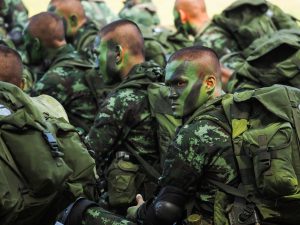Earlier this week, the head of Thailand’s armed forces reassured the public that the military would not stage a coup after the country’s upcoming general election. Gen. Chalermpol Srisawat, the commander in chief of the Royal Thai Army (RTA), told reporters on Tuesday that he expected to see the country’s democratic development continue under the current constitutional monarchy, the Bangkok Post reported.
Chalermpol was responding to journalists’ questions about how the military would react if the election, which is tentatively scheduled for May 7, 2023, significantly altered the political landscape. When asked directly whether it might launch a coup in response, he simply responded, “No, sir.”
He said, “The armed forces follow orders from the government that was formed through political means but we do not get involved in politics.”
Such promises issue liberally from the mouths of the top brass and spokespersons of the RTA, very often in response to journalists’ probing. As protests grew ahead of last month’s Constitutional Court hearing into the tenure of Prime Minister Prayut Chan-o-cha, a Defense Ministry spokesperson felt the need to insist that the military would not overthrow the government. “I assure you that there is no coup at all. Please feel relieved and at ease,” the spokesperson said.
Army chief Gen. Narongpan Jitkaewtae echoed the same sentiment shortly after his appointment in October 2020. “The chance of a coup is zero,” Narongpan said at the time, “provided no groups create conditions or violent conflicts that cause suffering.”
It is not surprising that Thai military commanders are constantly forced to field such questions. The RTA has carried out 12 coups since the end of the absolute monarchy in 1932 – 19 if one also includes unsuccessful attempts – and many of these have been preceded by sincere-seeming denials and disavowals. After Gen. Prayut Chan-o-cha imposed martial law on May 20, 2014, the military insisted that what was unfolding was not a coup. Two days later, it announced it was seizing control of the government.
While the question has become less pressing since 2019 given that the military is still effectively in charge under the current administration of Gen. (now Prime Minister) Prayut, it will become more urgent as Thailand approaches next year’s election. Prayut’s government, born from the coup of 2014 and cemented in power by a flawed election in 2019, remains deeply unpopular, and a genuinely free election would very likely return its opponents to power in some configuration.
How the military might respond is a salient question. The RTA’s interventions over the past 15 years have been aimed at averting the return of the fugitive former Prime Minister Thaksin Shinawatra, who became resoundingly popular after his election in 2001. Viewed as a threat to the country’s traditional royal establishment, Thaksin was removed from power in a coup in 2006, but the old guard has never quite succeeded in scrubbing away his influence.
After 2006, as Thaksin-aligned parties won repeated elections, the establishment used a variety of underhand legal means, some straying into the absurd, to remove his proxies from office. Eventually, it lost patience and launched another coup in 2014 to remove his sister, Yingluck Shinawatra, from power.
Despite all of these efforts, however, the Pheu Thai Party remains the largest party in the Thai parliament, and the five years of direct military dictatorship that followed the 2014 coup helped radicalize a younger generation of political activists that have taken aim not just at the military’s outsized role in Thai politics, but the monarchical power that stands behind it. True to type, after the youth-focused Future Forward Party scored significant gains in the 2019 election, a court banned it on a technicality. Its successor, the Move Forward Party, is now poised to run in the 2023 election.
In this context, it is therefore perfectly reasonable for journalists to ask how military commanders would react to the return of opposition forces at next year’s election. Whether their answers tell us anything of substance is another question. Indeed, the RTA’s history of interventions in Thai politics ensures that the promises of its commanders are pretty much the opposite of reassuring.

































